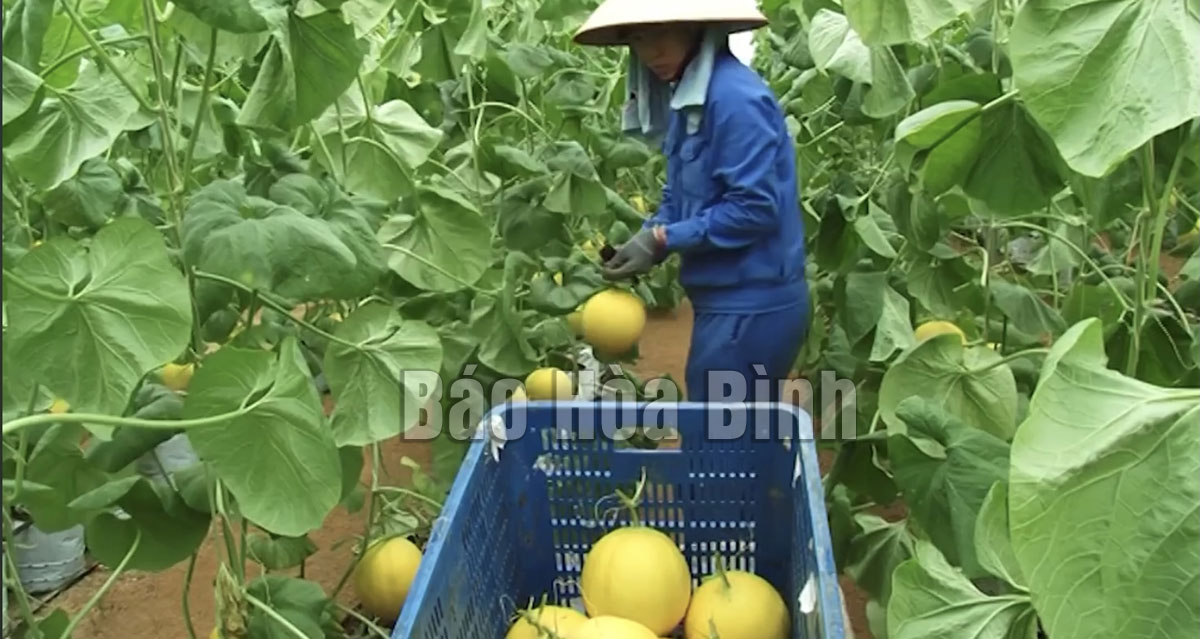
(HBO) - In recent years, chains serving agricultural product consumption have been formed in line with the conditions of each region. This have contributed to increasing value and creating stable sale of agricultural products.
Hami melons produced by the Hoa Binh GAP limited
company secure stable sale in Hanoi.
In order to promote agricultural restructuring for 2015-2020, the province
issued and effectively implemented resolutions and policies to develop the
local key products, and to support the operation of enterprises, cooperatives
and households. It also worked to boost economic cooperation and connection in
production and consumption of products to form a sustainable commodity agriculture,
while adjusting and setting up nine plans toward 2020 for new production areas.
In the five-year period, 93 firms and cooperatives
were introduced to join trade fairs, forums, and safe farm produce markets held
across the nation. Via trade promotion conferences, local companies signed ten
memoranda of understanding with their peers in Hanoi on linkage in distribution
of agro-forestry-fishery products.
The implementation of production chains supplying safe food during the period
resulted in the formation of some effective models that boosted productivity,
quality, product value and income. Key products of Hoa Binh have been available
in big shopping centres like Big C, Hapro Mart, Coop Mark, Lotte, and Biggree,
and served business class passengers of national flag carrier Vietnam Airlines.
However, for the production and distribution chains to be effective amid
complicated developments of COVID-19, the participation of the entire political
system and people is necessary./.
Dao Village’s honey – a product certified with a 3-star OCOP (One Commune One Product) rating by Thong Nhat Agricultural Cooperative in Dao Village (Hoa Binh City) – is highly regarded by consumers for its quality, richness, and variety in packaging. The distinctively sweet taste of Dao Village’s honey leaves a lasting impression on anyone who has tried it.
In alignment with Project No. 07-DA/TU, issued by the Hoa Binh provincial Party Committee on November 1, 2021, Lac Thuy district has actively promoted investment and supported the sustainable development of its industrial and handicraft sectors during the 2021–2025 period. Alongside this, the district has remained committed to preserving and revitalising traditional craft villages.
Located in the northern part of Lac Thuy district, with a temperate climate and fertile soil, Phu Thanh commune has great potential and advantages in growing tea. The long-standing experience, combined with strict adherence to organic farming practices in the tea gardens, ensures that the dried tea products from Phu Thanh and Lac Thuy as a whole are sold out immediately upon production, providing a stable and prosperous life for the local people.
Amid efforts to streamline the administrative apparatus, Hoa Binh province has intensified measures to address challenges in land clearance, resettlement support, and infrastructure investment, aiming to speed up the progress of key projects.
Hoa Binh province has posted an unprecedented economic growth rate of 12.76% in the first quarter of 2025, marking its highest quarterly performance to date and positioning it as the second fastest-growing locality in the country, trailing only Bac Giang province.
Under current regulations, products in the One Commune – One Product (OCOP) programme that are rated three stars or higher must undergo re-evaluation every three months. However, in reality, some of these products fail to consistently meet the required standards, raising concerns about the sustainability of their OCOP certification. This underscores the urgent need for producers to enhance product quality and gradually develop their OCOP products into strong, marketable brands.



